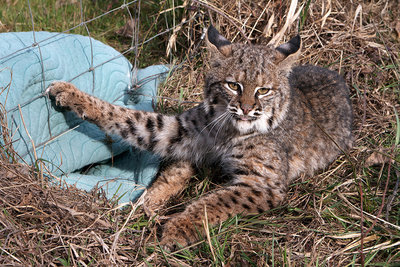
“Right now at this moment a coyote is strangling in a neck snare or a wolf is struggling in a leghold trap,” says Brooks Fahy, executive director of Predator Defense and one of the nonprofit’s founders. The predator advocacy group is celebrating 25 years of work to protect coyotes, wolves, cougars and other predators on Nov. 5 with movies and a Q&A at the Bijou Art Cinemas on 13th Avenue.
Predator Defense started off in 1990 as Cascade Wildlife Rescue, a hospital and rehab for predators. Fahy says the journey started with three coyote pups whose parents had been killed by a government agent. Fahy raised and released them and that, combined with his involvement in political activism such as trying to ban trapping in Oregon, led him to get a license in Oregon rehab wildlife and then found the rescue.
After five years, Fahy and Cheri Briggs, who had joined him in 1992, ran into another dilemma. The group was rescuing and rehabbing predators only to release them into a shrinking habitat with “no safe place for them. There are traps everywhere, poison everywhere,” Fahy says. He points to Wildlife Services, a government agency that is charged with resolving “wildlife conflicts to allow people and wildlife to coexist” as a top killer of predators. The agency killed 2.7 million animals in 2014, down from 4 million in 2013. Animals killed range from birds to bears and include feral dogs and cats as well as several pet dogs.
Fahy and Briggs had been working on a campaign to stop the aerial gunning of wolves in Alaska, and they made the decision to address Wildlife Services, then known as Animal Damage Control, on a national level.
“There is no other organization in the country that’s dedicated more time and resources to these issues,” Fahy says.
Fahy says over the years one of the things he is most proud of is the relationships the group has formed with individuals from all walks of life. Former government agents have aided in exposing the bad science behind the trapping and the group has brought everyday people before Congress to testify about their dogs that have been poisoned or trapped.
Fahy says that stopping Wildlife Services from aerially gunning coyotes on Oregon’s Hart Mountain National Antelope Refuge is a prime example of Predator Defense’s work. It has “stood the test of time,” Fahy says.
In 1995, the refuge called to have the coyotes killed in response to a year in which almost no pronghorn fawns had survived, and Predator Defense, with the help of former refuge biologist Jim Yoakum, fought back, pointing to bad weather and habitat as the culprit for the low fawn survival. The gunning was stopped each time the refuge called for it. Pronghorn fawns rebounded without the gunning of predators and Fahy says that over the next 20 years this allowed the group to prove that nature, as opposed to predator control, works.
It has not been an easy journey, Fahy says, but working with Predator Defense has been “extraordinary.”
There will be three films shown at the Bijou to celebrate Predator Defense’s 25 years, and staff — including Fahy, carnivore advocate Sally Mackler and filmmaker Paul Garrett — will be at the theater to answer questions. The films include a 10-minute documentary about a rescued and released bobcat, The Imperiled American Wolf and Predator Defense’s latest film, Exposed: USDA’s Secret War on Wildlife.
The event, presented by Encircle Films, starts at 6 pm at Bijou Art Cinemas, 492 East 13th Avenue. Ticket prices are $8.50 in advance, with senior, student and member discounts available. Tickets can be purchased at bijou-cinemas.com or at the door.